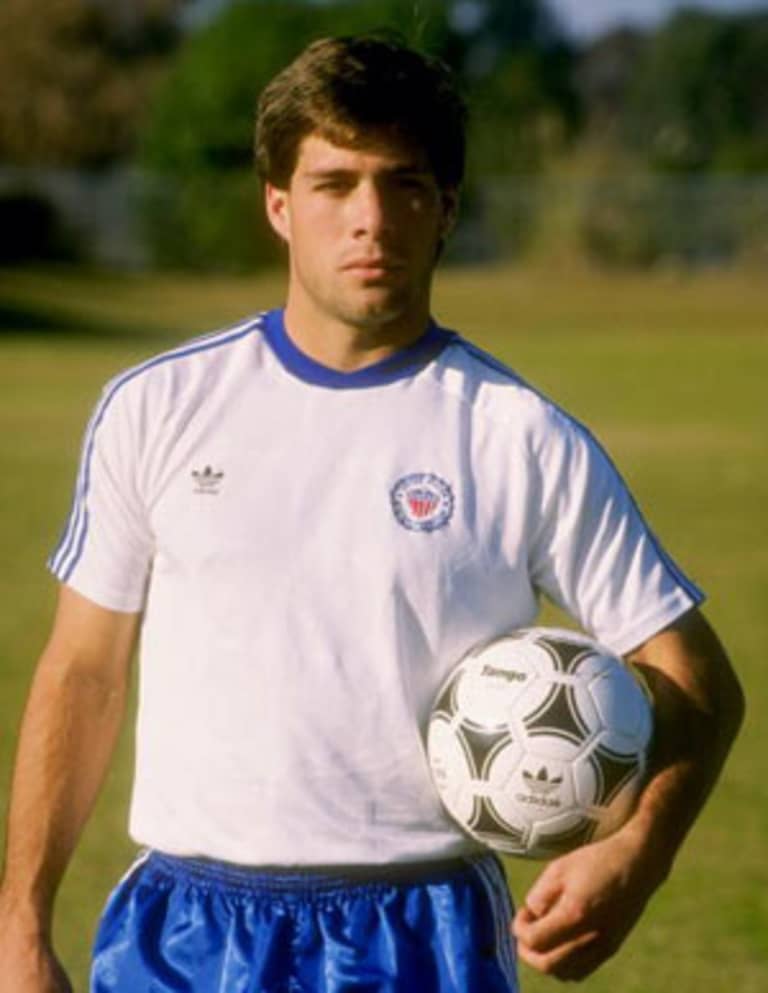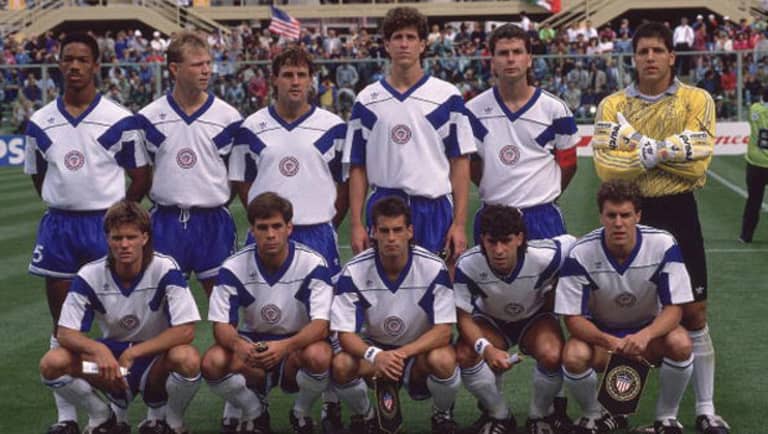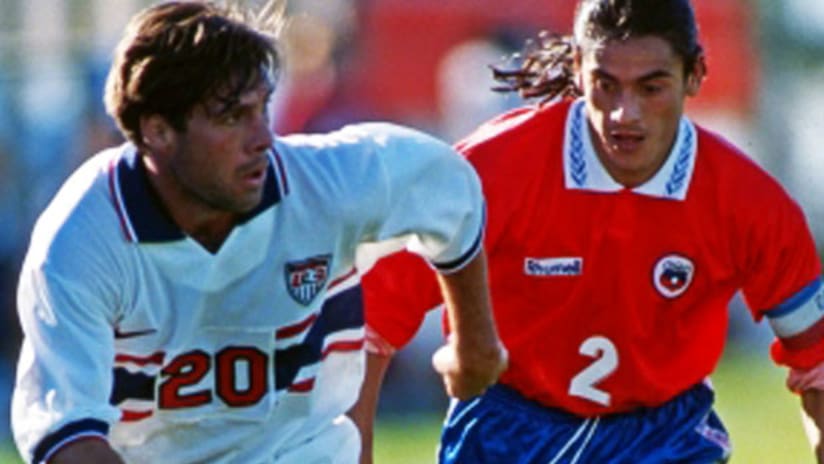Twenty-five years ago today, Paul Caligiuri scored the most important goal in American soccer history – a looping volley in Port of Spain that beat Trinidad & Tobago and sent the US national team to the 1990 World Cup, their first finals in 40 years.
The goal's iconic stature has only grown over the years, illuminated by the advances the sport has made in this country.
Caligiuri, now 50, understands this better than most. It was an unexpected strike -- he'd been instructed by head coach Bob Gansler not to go forward, so scared were the Yanks of T&T's speed on the counter -- but its impact on American soccer has been profound.
Caligiuri was one of the few US pros in Europe in 1989, playing at the time for SV Meppen, the second of five German clubs that employed him, and he went on to win 110 caps, play in two World Cups and star for the Columbus Crew and his hometown LA Galaxy in Major League Soccer.
Here's how Caligiuri remembers that fateful afternoon and what followed.
MLSsoccer.com: Set the scene for us.
Paul Caligiuri: We knew it was an important game -- the most important game, because it was the final qualifying match for our dreams to go to the World Cup. But we also realized that Trinidad & Tobago had not lost at home, they were the favorite, and we had not won a game on the road. We had to win, so our backs were against the wall. And there was added pressure because we learned while we were in camp in Florida for the week prior to the game that there was a possibility that the 1994 World Cup would be stripped from us if we didn't qualify for 1990.

Paul Caligiuri, scorer of what's widely regarded as the biggest goal in US Soccer history. (Getty Images)
MLSsoccer.com: How was the game proceeding before the goal?
Caligiuri: We're in a festive country in the Caribbean, and they called it the sea of red: The entire country was wearing red. They painted their cars red, they painted their houses red, everyone was in red, and they came out with that same attitude and ambition. I felt Trinidad was getting the better of us, and they had more momentum than us, and there's a slight scare when there's a questionable penalty kick that wasn't called, where John Doyle took down [Dwight Yorke] and there was some contact, and we got away with something, I thought. We weren't connecting as a team, and we were struggling a bit to get momentum going, and I was wondering who's going to wake us up.
MLSsoccer.com: You scored in the 30th minute, largely against the run of play. How did you see the play develop?
Caligiuri: We weren't able to get a rhythm going, so we weren't able to control the tempo, so the only way to control the tempo was to [slow the game], and as fate would have it, the ball went out of bounds, and it took a few seconds to get it started, and it kind of took the wind out of them.
It was a routine throw-in. Brian Bliss throws it to Tab Ramos, and he's not a danger, he's not a threat. Trinidad put nine, 10 guys behind the ball, and normally Tab would probably penetrate – he likes to dribble, he could beat guys individually, and they're laying off of him. Maybe he just decided to play the simple ball, give it to me and maybe switch the point of attack, and let's maintain possession. So he found me standing free in the center part of the field about 45 yards from the goal.
MLSsoccer.com: What was on your mind when you got the ball? At one point did you decide to shoot?
Caligiuri: I'd been looking for someone to get the spark going, so when I got my opportunity, I figured I'd get it going, let me push the ball forward and see what happens. And I'm kind of breaking the orders of Coach Gansler, because he wanted me to stay back and not go forward, in fear of a possible counterattack, so I pushed the ball forward with the ambition to get the attack going but not necessarily to finish the attack. And what happened was pure instinct.
As I pushed the ball forward, the defender rushes forward, and now it's beat the guy or if I don't beat the guy and I get the ball stolen, there's a possible counterattack, and that's the last thing I want to do is break my orders and then lose the ball on top of it. The moment I beat the player, it was all instinct from that point. I shot the ball with as much accuracy as I could, with as much velocity and topspin and power to get it there.
MLSsoccer.com: Did you know it was in before it was in?
Caligiuri: I didn't, but the moment I touched the ball off my foot, I knew I hit it well and it had a chance. And it had a good chance.
MLSsoccer.com: What do you remember in seeing the ball in the net and the moments that immediately followed?
Caligiuri: In some ways, it was a moment of disbelief. Like, “I scored? We scored?” That's what went through my head. Then my thought was: Celebrate. I wasn't a top goalscorer, so I started running, and then you're supposed to slide, so that's what I did. And the boys fell into place, join the pile and celebrate, and that broke the ice.
By the time we entered the locker room [at halftime], I knew we were going to win that game. I knew in my heart and my mind. I didn't know how it was going to play out, of course, but I could see the determination and I could feel the confidence, and I knew these players – I knew Tab Ramos, John Harkes and Tony Meola and Bruce Murray and Peter Vermes and Doyle and Mike Windischmann, every one of these guys. I knew we were going to get the best of them, that we were going to put it together, and that's what happened. Trinidad came at us with everything, and it never let up until the 90th minute, and we deserved that victory for sure.
MLSsoccer: That's an iconic goal in American soccer.
Caligiuri: It's a goal I'm grateful and honored to have that moment and share it with my teammates, and for all the past and future soccer players for this country. But I also think we share it on a global level. That victory not only changed the course of US soccer forever, but it brought the largest sports market into the FIFA family forever, and that has a huge impact for global soccer.
We're no longer considered a niche sport or a foreign sport. This is an American sport, and it's proven over and over now. Already we fill stadiums and excite American sports fans -- and non-sports fans when the World Cup comes along. There's huge interest in television and marketing and sponsorship. International teams come here for games. That moment, that victory arguably, probably is the greatest victory of any sport, ever.
–

Caligiuri (bottom row, second from left) and the rest of the US team before their first match of the 1990 World Cup, against Czechoslovakia. (Getty Images)
–
MLSsoccer.com: Wow.
Caligiuri: I can't think of any other big moment that's changed not only the course of a sport, but given so many opportunities for the world. I'm not saying it's me, the goal, that changed it – it's the victory.
MLSsoccer.com: How often are you asked about that goal?
Caligiuri: It keeps coming up at different periods. Obviously, it's peak periods: When you're in the soccer environment or when it's World Cup qualifying time or … November.
MLSsoccer.com: You're remembered for the goal in Port of Spain, but many forget you also scored the first World Cup goal in 40 years for the US, in the 5-1 loss to Czechoslovakia in Florence.
Caligiuri: These moments of soccer, you can never predict. They just happen.
MLSsoccer.com: It really didn't matter what results we achieved in that World Cup. It was all about opening that door to what would follow.
Caligiuri: Someone had said that a player on the Italian team, a quarter of his salary would pay for the entire US team. We weren't in awe. By the time we arrived in Italy, I think we were the curious stepchild.
“OK, the Americans are here. They play soccer.”
Now we're a worthy opponent; back then, we were not, and I think people were just happy to have the Americans there. The way we bounced back from the Czechoslovakia game … I always say this: US soccer grew up when we played Italy. We play Italy in Rome in the World Cup, and we only lose 1-0. We got the respect of the rest of the world. We almost shocked the world -- we almost shocked Italy at the World Cup [and might have, had a Peter Vermes shot not been cleared off the goal line]. I think we proved to the world that America has arrived.
MLSsoccer.com: Where do we go from here?
Caligiuri: That's my question, for the readers. Where are we in another 25 years? I hope we win a World Cup, and I hope I'm here for it. And in some ways, I hope we're not saying my goal is the most important goal, because maybe someone scores a goal and wins the World Cup for us.












